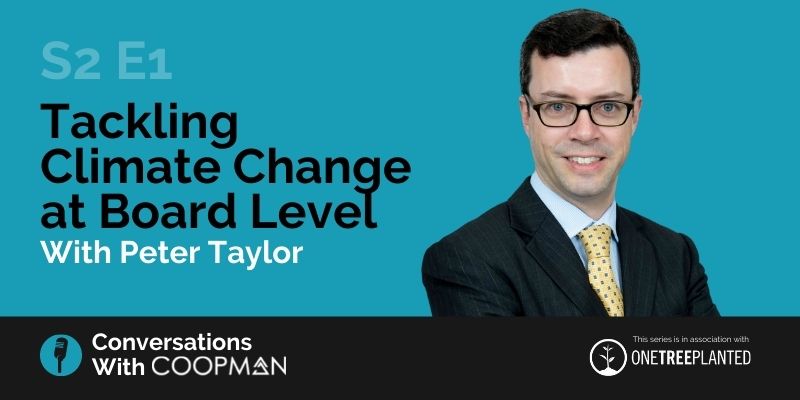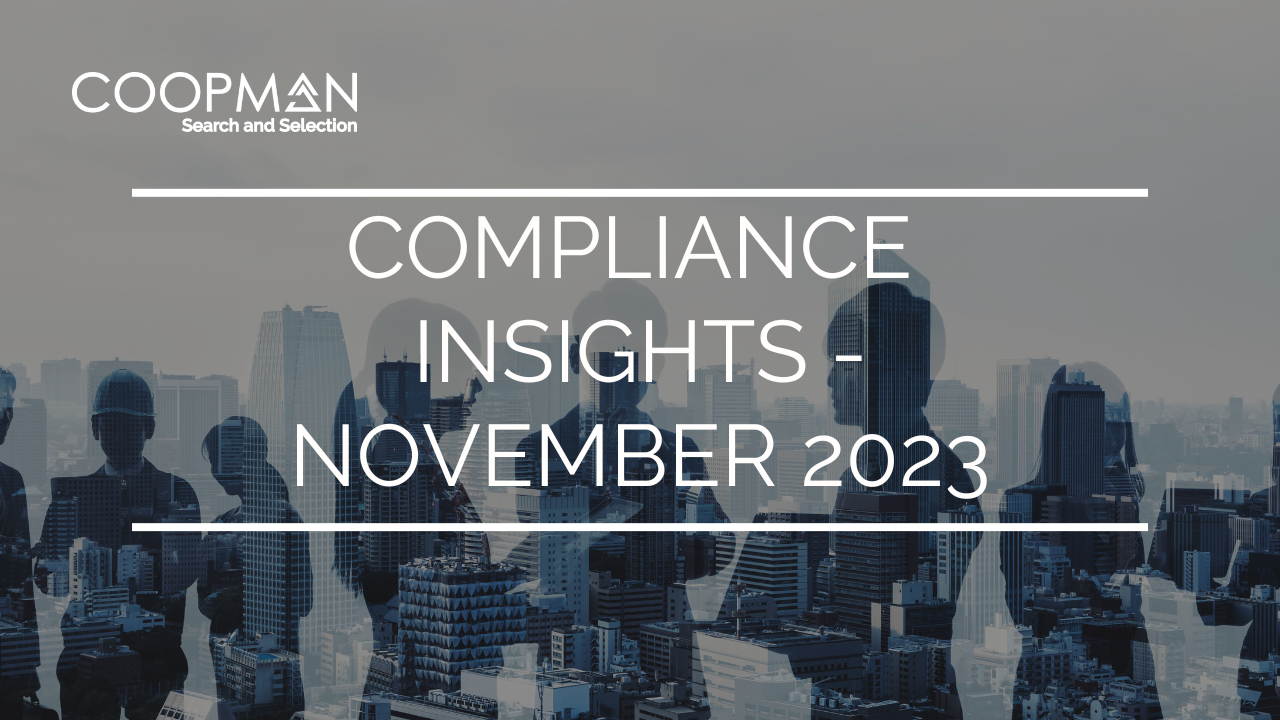We are delighted to launch Series 2 of Conversations With Coopman, Making Sustainability Your Business in association with global non-profit reforestation organisation, One Tree Planted. This series focuses on how businesses across financial services are embedding sustainability into their operations, as well as creating innovative solutions to tackle climate change and to have a positive impact on the environment. In our first episode, Peter Taylor, advisor on environmental, social and governance (ESG) integration and sustainable investing, joins co-hosts Andrew Murphy and William McCoppin to discuss climate governance.
Following a 20-year investment career, Peter is now an advisor to both company boards and institutional investors. Peter is a member of the Faculty of the International Corporate Governance Network (ICGN), an independent expert for the Climate Accounting Project and a special advisor on ESG for Nestor Advisors. From 2007 to 2020, Peter worked for Aberdeen Asset Management, one of Europe’s largest asset managers, as a Senior Fund Manager and Head of Corporate Governance. He was based initially in Singapore with the Asian Equities team before moving to join the Global Emerging Markets Equities team in London. Peter wrote the Aberdeen Corporate Governance Principles and established Aberdeen’s global proxy voting committee.
In this episode, Peter discusses climate governance, what boards should be thinking about when it comes to climate change, their readiness to tackle the challenges ahead and how investors are becoming more active on climate when it comes to voting. Peter articulates his views with passion and gives some valuable advice on how firms should address climate governance.
Some of the key discussion points from the conversation with Peter as well as the podcast recording and video are included below. To receive the latest podcast episodes straight to your inbox, sign-up to our podcast mailing list.
WHAT IS CLIMATE GOVERNANCE? IS THERE REALLY SUCH A THING OR IS IT JUST CORPORATE GOVERNANCE WITH THE WORD CLIMATE INCLUDED?
Climate governance is a recently emerged topic and to address the above – it’s a yes and no answer. On the one hand, it is not a new subject, it is an issue added to corporate governance but there are reasons as to why it is unique.
The complexity and uncertainty of climate change and policy responses, as well as the importance of this area to the public and to shareholders, means this issue offers a unique challenge, but it is the time horizon in relation to climate change that poses a different challenge to previous similar topics, like the technology change. The timeframe to deal with this is much longer than boards are used to dealing with (ie, quarterly) which is why it needs to be looked at in certain isolation.
WHAT SHOULD BOARDS BE THINKING ABOUT IN TERMS OF CLIMATE CHANGE?
Taking a step back to when global initiatives were launched, specifically the Task Force on Climate-Related Financial Disclosures (TCFD) which was introduced in 2017 and the World Economic Forum’s introduction of principles in corporate governance in 2019 – it is about reorienting corporate governance to now look at these initiatives. It comes back to the fact that this is not an alternative but involves taking OECD principles from the late 1990s and looking at these issues and at climate governance through these principles.
Take risk management for example – risk management looks at different scenarios and the overall impact to the company. A mining company may have different aligned prices for different commodities and a risk/scenario analysis to develop a strategy and response to climate change, the sector and the company.
It is important to have targets, however targets that are not set way out into the future. The current board and company need to be held accountable and it is these targets in the near term that do it, even if a net zero target is further down the line.
In this topic, there is a lot of complexity and you can dig into far more depth, but taking management alignment, and given the targets are very long term, one thing the board should be thinking about is how to align current management to these goals and this feeds into the debate of how to structure a company’s management incentive plan in order to do so.
ARE BOARDS READY TO TACKLE THE TASK OF CLIMATE CHANGE?
It is important to break down board readiness into two parts: 1) hardware and 2) software.
When it comes to hardware it is important to ask questions like “does the board have the right composition?”, “are they independent?”, “do they have diversity?”, and now “are there the climate skills needed on the board?”,
The last question is not to say boards need climate experts but people with more knowledge of the area. This will of course depend on the type of company, for example if you are in the cross hairs of the energy transition then there is an argument that the entire board needs to have this knowledge, but in other sectors maybe not. Ultimately, it is ensuring the board structure is right, built on having the right management structure.
Other areas to look at are “do you need a dedicated compliance officer?” or “do you delegate something as important as this to a committee?”. Various committees can have the responsibility of addressing climate issues and some firms have dedicated climate committees, whereas a more orthodox approach would suggest that if all the committees are doing their job then you wouldn’t need this – again a bigger debate but boards should be thinking about this.
Under software, a common question is “do the directors have the skills?” but it is too simplistic to bring in experts as and when there is an issue. Every director (company and sector depending) should have a level of climate knowledge, as the days are gone where you can say it’s not our problem, we don’t need to worry about it.
Boards should have climate risk on board issues and as a result of this importance, we are now seeing a rise of non-executive director groups emerging such as the Carbon Zero Network.
DO COMPANIES PROVIDE ENOUGH INFORMATION FOR INVESTORS IN RELATION TO THEIR CLIMATE DATA?
It is a rapidly changing space that will be different in 12 months time as there has been an explosion of reporting in this area and there is still room for improvement. One issue highlighted is that there are a lot of competing standards, but it is somewhat unfair to say they are competing, as they are trying to assess different data but overlap somewhat, for example CDP is a set of standards, whereas TCFD is the framework.
There is so much happening it can be confusing for stakeholders, company management and investors, and a possible solution is to consolidate these standards, and place the onus on companies and audit committees to cut through all the different options and look at fundamentally what they should be disclosing.
When you take a look at disclosures and for example, emissions in particular, there are scope 1, 2 and 3 emissions. Scope 1 and 2 are emissions of the company and products, scope 3 of the supply chain sourced by the company, and notwithstanding the complexity of calculating these, the glossy reports addressing scope 1 and 2 might be great unless it is the scope 3 emissions of the firm that are the real issue.
ARE SHAREHOLDERS GETTING MORE ACTIVE ON CLIMATE WHEN THEY ARE VOTING?
This is a fair question, and a board might ask “what is the bare minimum we can do and start from there?”. However the minimum that is expected now is going to be a lot different next year as the bar is only rising. The investor focus is manifesting itself into climate activism.
A recent high profile example of this was a small hedge fund, Engine No.1 who managed to get dissident investors to the board in ExonMobil.
Something else that is less high profile, is institutional Investors thinking how they can change proxy voting systems. An example might be that if there is no evidence that an audit committee is not considering climate change in their disclosed financial statements, what can be done to the proxy voting system? Will companies react before or after this event? Institutional investors and the public are making much greater demands so companies need to think about responding to that before putting directors up for election.
Don’t just watch high profile cases but look at the systematic activities that will happen.
Listen to “Tackling Climate Change at Board Level With Peter Taylor” on Spotify, Apple, Google Podcasts or Anchor now, watch it on YouTube, or sign-up to receive the latest podcast episodes straight to your inbox.
If you are interested in taking part in the podcast series, send your details to connect@coopman.ie and we will be in contact soon.








